HONG KONG’S new security law will outlaw freedom of expression in what was once Asia’s cinematic jewel, and now a list of the city’s acting talent such as Jackie Chan and Lisa Wang have come forth to pledge their support for the totalitarian edict, but what would the city’s most famous son have made of the current political crisis?
As the world approaches the anniversary of the Tiananmen Square massacre on June 4 Hong Kong teeters on the edge of a precipice.
The city’s streets have become a battleground between the personality cult of Xi Jinping and the principle of freedom of the individual.
Now a petition has been signed by many of the Hong Kong’s famous actors to support Beijing’s implementation of an authoritarian new security law that criminalises “any acts or activities” that endanger China’s national security, including separatism, subversion and terrorism.
But if Bruce Lee were still alive, would he have signed up to endorse the edict as Jackie Chan has done, or would he refuse like Chow Yun Fat, leading to considerable professional risk?
Unnatural Naturalness
Bruce Lee had a description for the delicate balance of control and impulsive instinct in his martial art of Jeet Kun Do, he called it, unnatural naturalness, or “acting but not acting”.
It is conceivable to imagine the Chinese Communist Party, CCP, propaganda machine re-framing the duality at the heart of Jeet Kun Do to explain how their free market capitalist policies contradict their Maoist rhetoric, or in the case of this article, how their action of implementing a law that outlaws personal expression contradicts their rhetoric of promising to always defend Hong Kong’s autonomy.
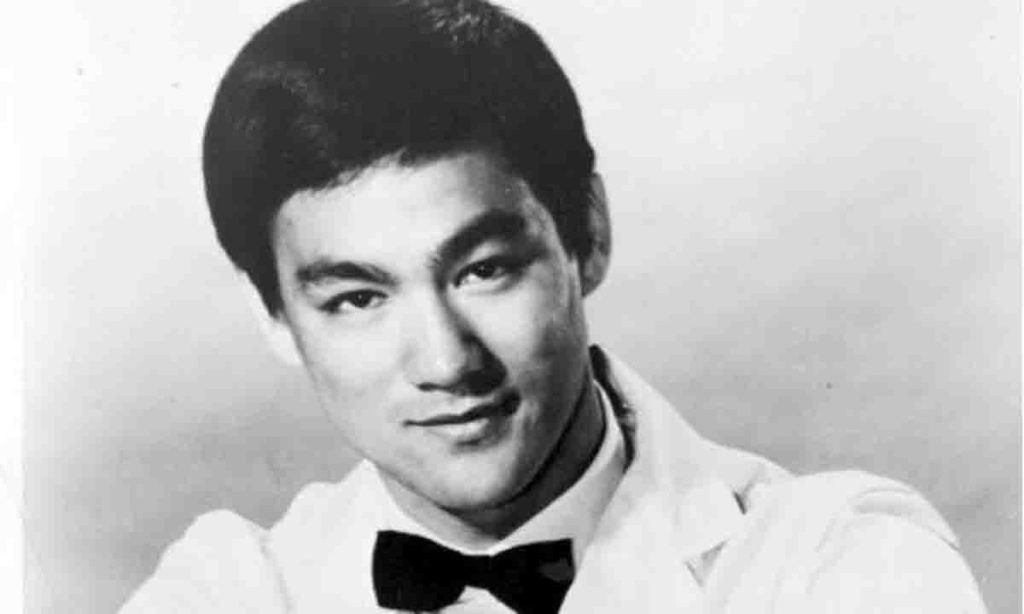
Be water, my friend
The quintessential martial arts star of such cult classics as Game of Death and Enter the Dragon would have turned 80 this November. His body of work and philosophy still remain vital, as another of Bruce Lee’s sayings, “Be water, my friend”, has become a clarion call for the pro-democracy movement in Hong Kong. Would he have offered his endorsement of this or seen it as hijacking and polarising his philosophy? In his notes the martial artist describes the moment of inception when he came up with the idea. At the age of 17 in order to gather his thoughts he took a boat out onto Kowloon bay. He was emotional after realising his ego was interrupting his ability to progress in his training under Wing Chun master, Ip Man. Kneeling over the keel of the boat he punched the water and he describes having a sudden realisation of a core mysteries of Kung Fu, which was, to be like water. The more he punched the more the water reshaped and displaced itself around his fist and when he grabbed it, it tickled gently through his fingers. The water was all encompassing, “it could flow, or it could crash, be water my friend”. The the phrase has now taken on new life as the slogan of the pro-democracy movement, where the protesters are leaderless and they seem to gather and disperse spontaneously. They are always flowing, making it hard for the authorities to grasp and crush, because there is leader, no head, and like a hydra, when one head is cut many more grow.
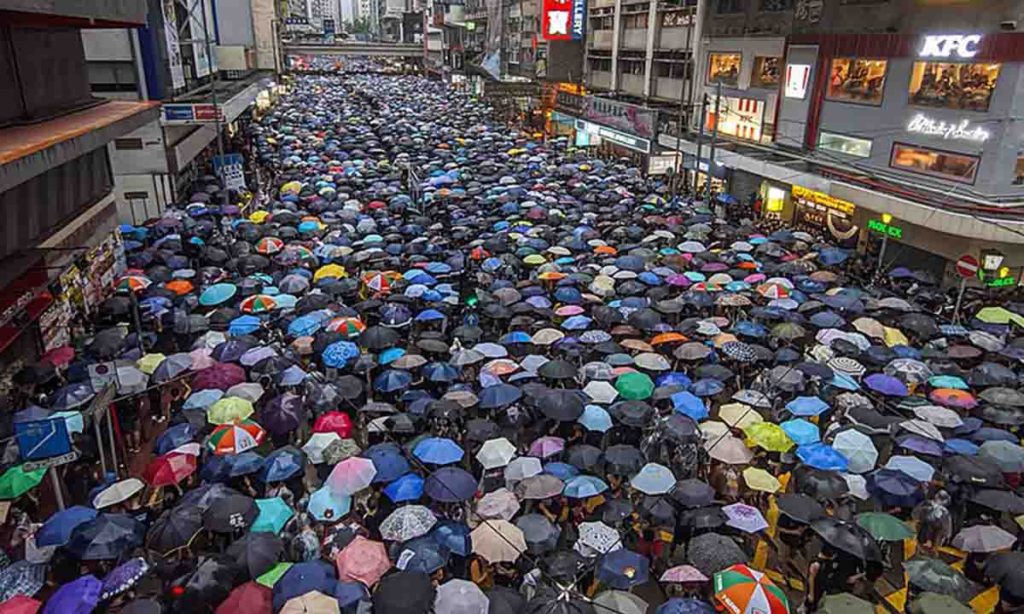
Honestly expressing oneself
In a 1971 interview with Pierre Berton Bruce Lee explained that the ultimate goal of martial arts was the honest expression of oneself. In the interview he said, “honestly expressing oneself totally and completely, without lying to oneself”. But, in mainland China, walking this path would sooner or later find the practitioner under house arrest, or worse. Within the ideological straight-jacket administered by the CCP every citizen must check and second guess their actions for fear of falling fowl of the regime. Therefore the authoritarian laws that Jackie Chan, Alan Tam and director Clifton Ko endorse are diametrically opposed to the philosophy that Bruce Lee lived his life by. The new laws against freedom of expression would have been anathema for the free thinking Bruce Lee. Lately the Chinese Communist Party, CCP, have sanctioned Lee safe enough to be showcased to the masses, albeit a version that has been re-branded as a Chinese nationalistic hero. But it wasn’t always like this, Lee was not always welcome, Chairman Mao was not a fan and the communist authorities banned his films calling them spiritual pollution and rightist sentimentality. But, now mainland Chinese producers are making up for lost time with the release of an epic 50 part series based on the icon’s life.
Bruce Lee in mainland China
The series called, The Legend of Bruce Lee, a 50-part TV series aired on state broadcaster CCTV in 2008 introduced many in mainland China to Bruce Lee for the first time. The series portrays him as a nationalist hero, who battles colonialism as though he is tasked with settling the score of China’s century of humiliation. This version of Lee disregards his famous phrase, ‘Be water my friend’, for fear of alluding to the democratic struggle in Hong Kong. The phrase may well end up sitting alongside other taboo words such as Winnie the Pooh, Blizzard Entertainment and Animal Crossing on Xi Jinping’s ever growing list. Although this comprehensive serialised biopic is epic in scope, it also has some epic fabrications, such as a scene slotted in to appease Chinese film censors where Lee beats up an American man at a golfing tournament and then erupts with pride screaming, “I am Chinese! I am Chinese!” .
Move to Seattle
The martial artist was proud of his Chinese heritage and did more to boost the Sino-cultural currency than Mao Zedong and his CCP cadres , who actively tried to strip China of it’s rich heritage during the cultural revolution. But, Lee was actually born in San Francisco and only went back to Hong Kong when he was a child, returning to live in Seattle again in his late teens. As much an American as he was Chinese, a sore fact that goes against the grain of those promoting ultra-nationalism in mainland China.
Chinese nationalists prefer an image of Bruce that is horrified by the use of his philosophy by the “traitorous western stooges” of the Hong Kong protests, and argue that the riotous behaviour they display is the very opposite of his martial code. They point to films like 1972’s Fists of Fury as evidence of his nationalist fervour where he defends a Kung Fu dojo against Japanese imperialist aggression. But in real life Lee’s best friend was Japanese American Taky Kimura, who would go on to lead Jeet Kun Do after Lee’s death in 1973.
Bruce Lee’s complex ethnicity
One other sticking point is that Lee transcends rigid notions of ethnicity, and the stereotypes that tag along with it. His mother was of Eurasian decent, possibly having an English or German father. When he first expressed interest in martial arts, his mixed race DNA actually excluded him from the insular Wing Chun Kung Fu school run by Ip Man. It was only after he showed dogged determination that he was accepted into it’s secretive fold.
But, Lee wasn’t interested in nationality making it more probable that he would have declined the offer to support the ultra-nationalistic measures of the CCP. Counter to this he may also have declined the equally exclusive nationalist label of Hong Konger being adopted by some in the pro-democracy movement. On setting up his first dojo on 1122 Jefferson St, Seattle, his first student was African American Jesse Glover, who became the first Jeet Kun Do registered instructor. Once asked if he though of himself as either North American or Chinese. He answered: “I think of myself as a human being, because under the sky, we are but one family, it just so happens that we look different.” So in a way we can all claim Bruce Lee.
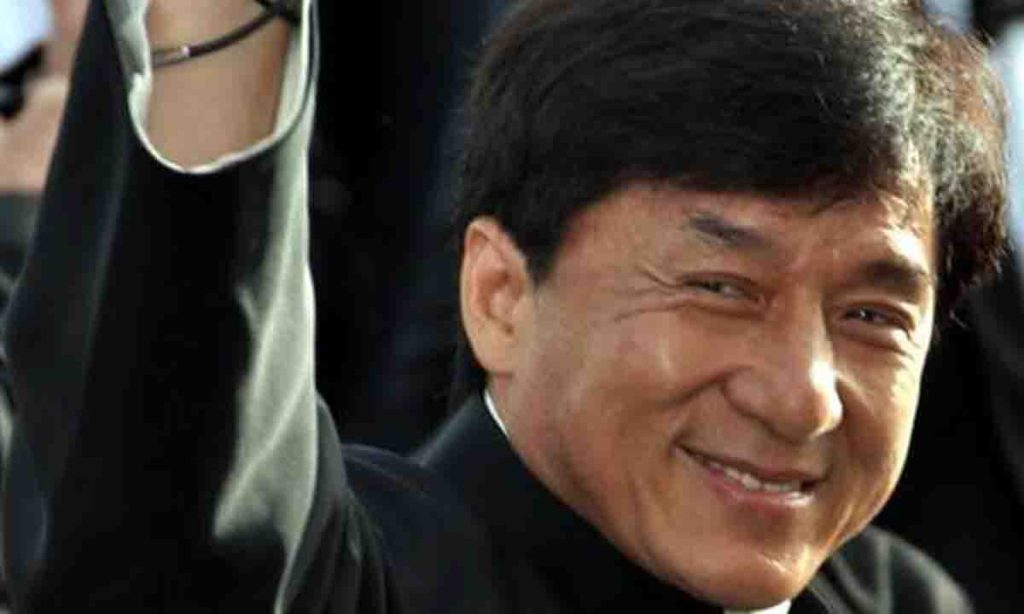
Jackie Chan’s support for the CCP
In 1989, after the brutal Tiananmen Square massacre, a 35-year-old Jackie Chan took to the streets of his hometown and sang in support of the 10,000 plus pro-democracy protesters who were brutally murdered. But people change, or the CCP hold secret compromises, because the martial arts superstar has since performed a complete u-turn, and become a yes-man for the politburo’s dogma.
The star of Rush Hour is now a member of the Chinese People’s Political Consultative Conference located in Beijing and has previously said that freedom for Chinese people “is not good”. Speaking of the Hong Kong protests in 2019 he said, “If you’re too free, you’re like the way Hong Kong is now. It’s very chaotic. Taiwan is also chaotic. I’m gradually beginning to feel that we Chinese need to be controlled.”
Xi Jinping’s neo-authoritarianism
Jackie Chan has often vocalised his support for the neo-authoritarianism of China’s President Xi Jinping. But the petition of support for Beijing’s new security law was also signed by Lisa Wang, Eric Tsang Chi-wai, Alan Tam, Kenny Bee, Warren Mok, Kara Wai, and Bobby Yip.
The petition signed by 2,605 of Hong Kong’s arts and cultural sector read: “We fully understand safeguarding national security is the utmost importance to Hong Kong, and we support the decision of the National People’s Congress, NPC, to impose national security laws in Hong Kong.
“We hope that when the NPC Standing Committee makes the relevant laws to block national security loopholes, it can at the same time guarantee the industry’s normal level of creative freedom and development.”
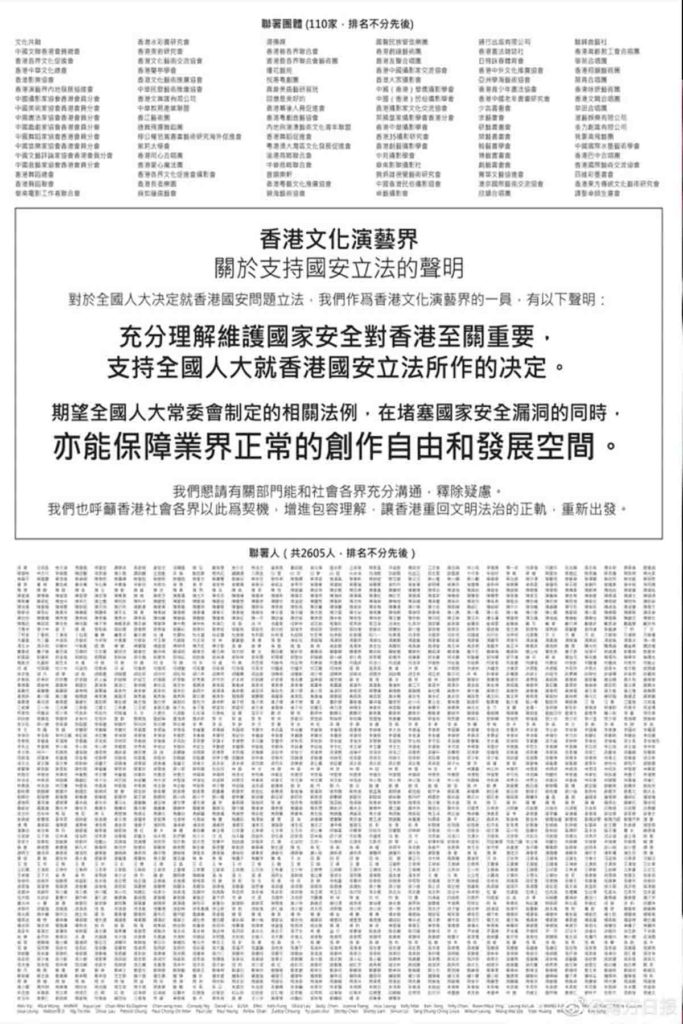
The gesture of support to what is deemed a tyrannical decision by the CCP is only window dressing as the ruling has already been ratified by China’s National Congress.
But stalwarts of Hong Kong cinema Chow Yun Fat, Andy Lau, Jackie Cheung have refused to sign up.
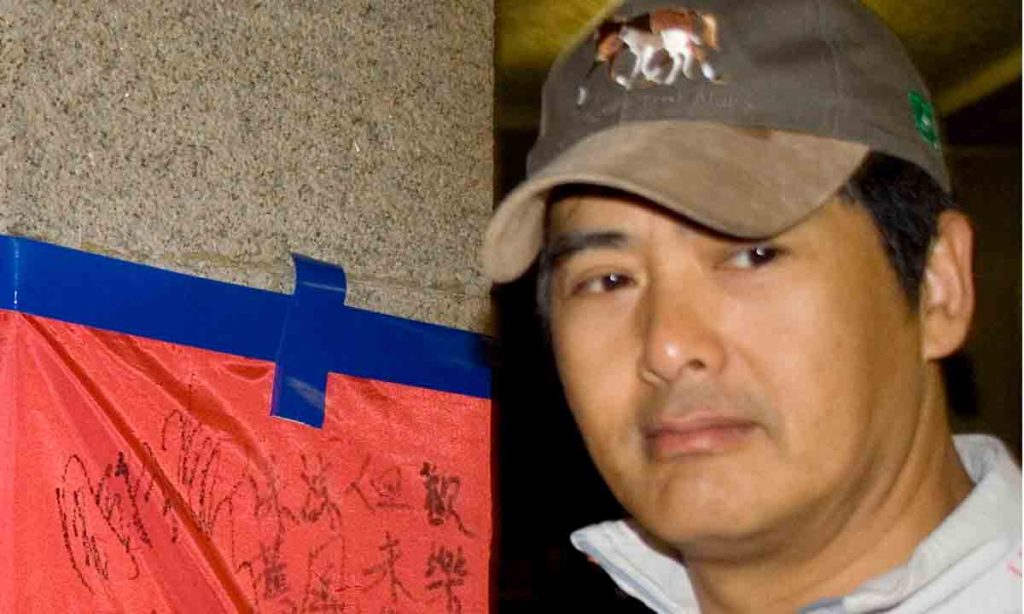
Chow Yun Fat refuses to kowtow to Beijing
In a 2014 interview with Hong Kong newspaper the Apple Daily Chow Yun Fat said, “I’ve met the residents, the students, they are very brave and it’s touching to see that they’re fighting for what they want. The students are reasonable. If the government can come up with a solution that the citizens or students are satisfied with, I believe the crisis will end.”
He added: “When the government uses violent measures on students, it’s a turn-off for the people of Hong Kong. I don’t wish to see anyone getting hurt, it was a peaceful demonstration and there was no need for any violence or tear gas.”
He subsequently was blacklisted by Beijing, but calmly responded to CCP threats that career opportunities would dry up after he chose sides, he said, “I’ll just make less movies then”.
Bruce Lee undervalued by HK Government
Bruce Lee was not interested in the world’s mundane political factions, he transcended this duality with his study of Tao and thinkers like Krishnamurti, but he did have an expectation that China would open itself to the world one day. He said this would, “bring more understanding.to both sides of the political divide, and in the contrast, there would be a greater understanding and new things will grow.” But the world’s most populous country has only reformed its economic system and the political restrictions are as tight as ever, frustrating any hope that “new things will grow”.
Lee is disappointingly ignored by the Hong Kong administration. Carrie Lam and company seem uninterested in halting the slow deterioration of the city’s cinematic culture, as the CCP strips it away to be centralised and sanitised in Beijing. Former governor Chris Patten may have been a fan of Lee, even suggesting that the road to the Airport should be named after him, saying it was a “jolly good idea”, but to date there is no public highway in Hong Kong named after the city’s biggest brand.
If alive today he may not directly involve himself in the pro-democracy struggle in Hong Kong, but he would encourage the population to stand up for their right to honestly express themselves, because suppressed spirits “miss all that heavenly glory”.
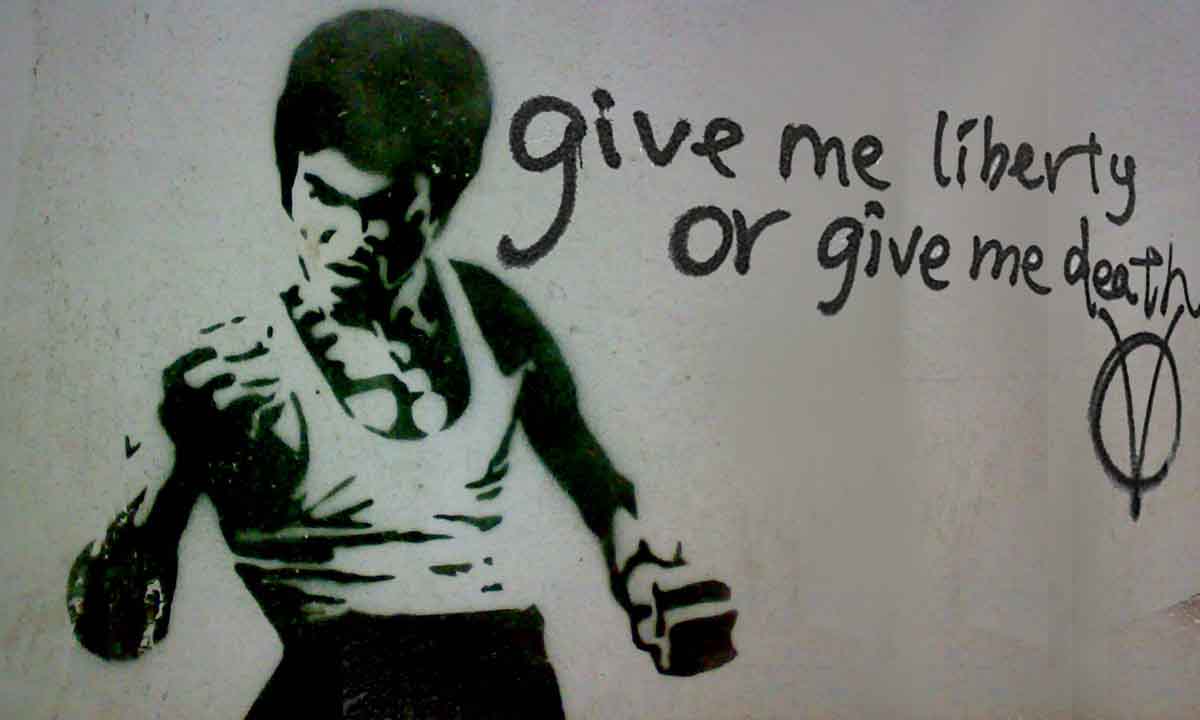

im very surprised at Jackie Chan ! did not think he would go to the dark side